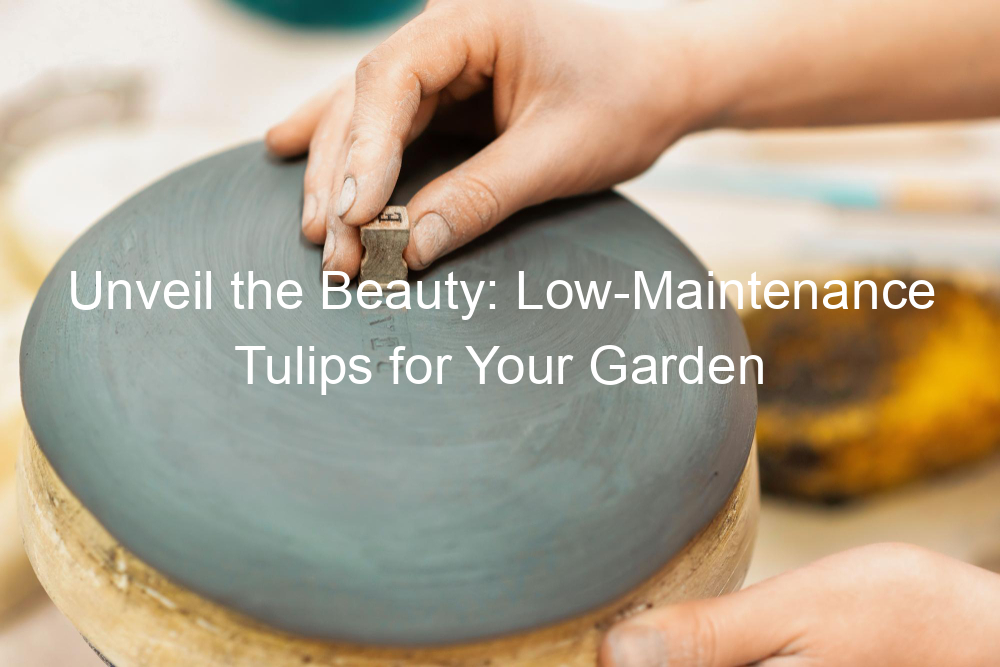Introduction to Tulip Zen
Welcome to the world of Tulip Zen, a unique approach to gardening that combines the beauty of tulips with the tranquility of Zen philosophy. This introductory guide will help you understand the concept of Tulip Zen and how it can bring peace to your life.
-
- Understanding the concept of Tulip Zen
Tulip Zen is more than just a gardening technique. It’s a way of life that embraces the principles of Zen Buddhism, focusing on simplicity, mindfulness, and the natural beauty of tulips. The idea is to create a peaceful garden that serves as a sanctuary, a place where you can relax, meditate, and find inner peace.
-
- How Tulip Zen can bring peace to your life
Engaging in Tulip Zen gardening can have a profound impact on your life. It’s not just about growing beautiful tulips, but also about cultivating peace of mind. The act of planting, nurturing, and observing tulips can be a form of meditation, helping you to stay present and focused. Moreover, the vibrant colors and delicate forms of tulips can uplift your mood and bring a sense of joy and tranquility.
In the following sections, we will delve deeper into the process of creating your peaceful Tulip Zen garden, finding peace in your tulip garden, and embracing peace in nature. We will also share some inspiring case studies of Zen gardening success stories. So, let’s embark on this journey of Tulip Zen and discover the joy and peace it can bring to your life.
Creating Your Peaceful Garden
Creating a peaceful garden is a journey that begins with understanding the elements that make up your garden. One of the most important elements is the type of flowers you choose. In this section, we will focus on tulips, a popular choice for many gardeners.
Choosing the Right Tulips for Your Garden
Choosing the right tulips for your garden is a two-step process. First, you need to understand the different types of tulips. Second, you need to choose tulips based on your climate and soil. Let’s explore these steps in detail.
-
- Understanding different types of tulips
It is also came in a variety of types, each with its unique characteristics. Some of the most common types include the Single Early, Double Early, Triumph, and Parrot tulips. Single Early tulips bloom early in the spring and have a classic tulip shape. Double Early tulips have extra petals, giving them a fuller appearance. Triumph tulips are known for their strong stems and large flowers, while Parrot tulips are recognized for their ruffled and striped petals.
-
- Choosing tulips based on your climate and soil
After understanding the different types of tulips, the next step is to choose the right tulips for your climate and soil. Tulips generally prefer a cooler climate and well-drained soil. However, some types of tulips can tolerate warmer climates. For example, the Darwin Hybrid tulips are known for their ability to thrive in warmer climates. On the other hand, the soil should be well-drained as tulips do not like wet feet. Adding organic matter to your soil can improve its drainage and provide nutrients for your tulips.
In summary, creating a peaceful garden involves choosing the right tulips that suit your garden’s climate and soil conditions. By understanding the different types of tulips and their preferences, you can create a beautiful and peaceful tulip garden.
Designing Your Tulip Garden
Designing a tulip garden can be a fun and rewarding task. It involves two main steps: planning your garden layout for optimal growth and creating a visually pleasing arrangement. Let’s explore each of these steps in detail.
-
- Planning Your Garden Layout for Optimal Growth
Planning your garden layout is the first step in creating a successful tulip garden. This involves considering factors such as sunlight, soil type, and water availability. Tulips need a good amount of sunlight to grow, so make sure your garden is in a spot that gets at least six hours of sunlight each day. The soil should be well-drained as tulips do not like to sit in water. Also, remember to leave enough space between each tulip for them to grow without crowding each other.
Here’s a simple table to help you understand the basic needs of tulips:
| Factor | Requirement |
|---|---|
| Sunlight | At least 6 hours a day |
| Soil | Well-drained |
| Space | Enough to avoid crowding |
-
- Creating a Visually Pleasing Arrangement
Once you’ve planned your garden layout, the next step is to create a visually pleasing arrangement. This involves choosing tulips of different colors and heights to create variety and interest. You can also consider adding other elements like rocks, benches, or bird baths to enhance the beauty of your garden.
Keep in mind, the goal is to create a garden that not only grows well but also brings you peace and joy every time you look at it. As the famous garden designer Gertrude Jekyll once said, “The love of gardening is a seed once sown that never dies.”
Finding Peace in Your Tulip Garden
One of the most rewarding aspects of tulip gardening is the peace and tranquility it can bring. This peace is not just about the beauty of the flowers, but also about the process of tending to them. In this section, we will explore how you can find peace in your tulip garden through the practice of garden meditation.
Garden Meditation
Garden meditation is a practice that combines the calming effects of nature with the focus and clarity of meditation. It allows you to connect with your garden on a deeper level, appreciating its beauty and tranquility in a whole new way.
-
- Understanding the basics of garden meditation
Garden meditation is not complicated. It’s about being present in your garden, focusing on your breath, and letting go of any distracting thoughts. You can meditate while sitting, standing, or even while working in your garden. The key is to be fully present and aware of your surroundings.
-
- How to practice garden meditation in your tulip garden
Practicing garden meditation in your tulip garden is a wonderful experience. Start by finding a quiet spot in your garden. It could be a bench or a patch of grass near your tulips. Sit or stand comfortably, close your eyes, and take a few deep breaths. As you breathe in, imagine the scent of the tulips filling your lungs. As you breathe out, imagine any stress or tension leaving your body. Focus on the sensation of the air entering and leaving your body, and if your mind starts to wander, gently bring it back to your breath.
Keep in mind, the goal of garden meditation is not to achieve a certain state of mind, but to simply be present and aware. With practice, you will find that this simple act can bring a deep sense of peace and tranquility, transforming your tulip garden into a sanctuary of calm and serenity.
Tulip Meditation
One of the most effective ways to find peace in your tulip garden is through tulip meditation. This practice involves using tulips as a focus point during your meditation sessions. Let’s delve into how you can do this and the benefits you stand to gain.
-
- Using tulips as a focus point in your meditation
Meditation is all about focus and awareness. Tulips, with their vibrant colors and calming presence, make an excellent focus point. To start, find a comfortable spot in your tulip garden. Sit in a relaxed position, close your eyes, and take a few deep breaths. Now, open your eyes and focus on a tulip. Observe its color, shape, and texture. As you do this, let all other thoughts drift away. Your mind should be fully absorbed in the beauty of the tulip. This simple practice can help you achieve a deep state of relaxation and mindfulness.
-
- Benefits of tulip meditation
Tulip meditation offers numerous benefits. First, it helps to reduce stress and anxiety. The simple act of focusing on a tulip can help you let go of negative thoughts and emotions. Second, it enhances your mindfulness. By paying close attention to the tulip, you become more aware of your surroundings and your own thoughts and feelings. Lastly, tulip meditation can improve your appreciation for nature. As you meditate, you’ll begin to notice the intricate details of the tulip and the beauty of your garden. This can foster a deeper connection with nature and a greater sense of peace.
| Benefits of Tulip Meditation |
|---|
| Reduces stress and anxiety |
| Enhances mindfulness |
| Improves appreciation for nature |
Indeed, tulip meditation is a powerful practice that can help you find peace in your tulip garden. By using tulips as a focus point, you can achieve a deep state of relaxation and mindfulness. Plus, the benefits of this practice extend beyond the garden, improving your overall wellbeing and connection with nature.
Embracing Peace in Nature
There’s a unique tranquility that nature provides, and one of the ways to embrace this peace is through gardening. Gardening allows us to connect with the earth, cultivating not only plants but also a sense of calm and serenity.
Gardening for Peace
Let’s dig into how gardening can promote peace and tranquility and provide practical tips for finding peace through gardening.
-
- How gardening can promote peace and tranquility
Gardening is a therapeutic activity. It allows us to slow down, focus on the task at hand, and momentarily set aside our worries. The simple act of planting and nurturing a seed to life can bring a sense of accomplishment and peace. Moreover, the rhythmic nature of gardening tasks like digging, planting, and watering can be meditative, promoting a state of tranquility.
-
- Practical tips for finding peace through gardening
Here are some practical tips to help you find peace through gardening:
-
- Start small: You don’t need a large space to start gardening. A small pot or a window box is enough to get you started. The key is to start and gradually expand as you get more comfortable.
- Choose plants you love: Select plants that you enjoy caring for. This could be flowers, vegetables, or herbs. When you love what you do, it becomes a source of joy and peace.
- Make it a routine: Try to set aside a specific time for gardening each day. This routine can become a peaceful ritual that you look forward to.
- Be patient: Gardening is a process that requires patience. Remember, the goal is not just to grow plants, but to cultivate peace and tranquility.
Indeed, gardening is a wonderful way to embrace peace in nature. It allows us to slow down, connect with the earth, and cultivate a sense of tranquility. So, why not give it a try? You might be surprised at the peace and joy it brings to your life.
Creating a Zen Garden
Creating a Zen garden is a delightful journey that combines the beauty of nature with the tranquility of Zen principles. In this section, we will explore the concept of a Zen garden and how you can incorporate these principles into your tulip garden.
-
- Understanding the concept of a Zen Garden
A Zen garden, also known as a Japanese rock garden, is a small, enclosed landscape designed to stimulate contemplation and meditation. It typically includes rocks, gravel or sand, and occasionally, water features and moss. The rocks represent islands, while the sand or gravel is raked to symbolize water ripples. The Zen garden is a symbol of tranquility and peace, a place where the mind can wander freely and find serenity.
-
- How to incorporate Zen principles into your tulip garden
Incorporating Zen principles into your tulip garden can transform it into a peaceful sanctuary. Here are some tips:
-
- Minimalism: Zen gardens are typically simple and uncluttered. Choose a few types of tulips and arrange them in a simple, pleasing pattern.
- Balance: Zen gardens often use asymmetry to create balance. You can do this by planting tulips of different heights and colors.
- Naturalness: Allow your tulips to grow naturally, without too much pruning or shaping. This will give your garden a more organic, Zen-like feel.
- Tranquility: Create a quiet, peaceful space around your tulip garden where you can sit and enjoy the beauty of your flowers. This could be a simple bench or a small gazebo.
By understanding the concept of a Zen garden and incorporating its principles into your tulip garden, you can create a space that not only showcases the beauty of your tulips but also provides a peaceful retreat where you can find tranquility and peace.
Case Studies: Zen Gardening Success Stories
Let’s explore some real-life success stories of individuals who have transformed their lives and spaces through Zen gardening.
-
- Case Study 1: Transforming a backyard into a peaceful retreat
Meet John, a busy corporate executive who was looking for a way to unwind after long days at work. He decided to transform his neglected backyard into a Zen garden. John started by clearing out the clutter, followed by adding a small water feature for its calming sound. He then added a stone pathway, a few Zen sculptures, and a seating area. The final touch was a selection of low-maintenance plants, including moss, ferns, and bamboo.
John now spends his evenings in his garden, enjoying the tranquility it offers. He says, “My Zen garden has become my sanctuary. The simple act of tending to it helps me clear my mind and find peace after a stressful day.”
John’s story shows us that even a small backyard can be transformed into a peaceful retreat with some creativity and effort.
-
- Case Study 2: Finding inner peace through tulip gardening
Next, we have Sarah, a retired teacher who found inner peace through tulip gardening. Sarah always loved flowers, and when she retired, she decided to dedicate her time to growing tulips. She chose tulips because of their vibrant colors and the joy they brought her.
She started with a small patch in her garden, and over time, it grew into a large tulip field. Sarah says, “Tending to my tulips brings me a sense of peace and fulfillment. Watching them grow and bloom is a reminder of the beauty and resilience of nature.”
Sarah’s story is a testament to the therapeutic benefits of gardening. Not only has she created a beautiful tulip garden, but she has also found a way to nurture her soul.
These case studies highlight the transformative power of Zen gardening. Whether it’s creating a peaceful retreat in your backyard or finding inner peace through tulip gardening, Zen gardening offers a path to tranquility and fulfillment.
Conclusion: Embrace the Zen of Tulip Gardening
As we reach the end of our journey exploring the Zen of tulip gardening, it’s time to reflect on the tranquil beauty these vibrant flowers bring and the peace they can instill in us. Let’s recap the benefits and share some final thoughts on creating your own peaceful tulip garden.
-
- Recap of the benefits of tulip Zen
Tulip Zen is not just about gardening; it’s a way of life. It’s about finding peace, tranquility, and joy in the simple act of planting and nurturing these beautiful flowers. The benefits are manifold:
-
-
- Stress Relief: Gardening, especially tulip gardening, is a great way to relieve stress and anxiety. The simple act of tending to your tulips can help you feel more relaxed and at peace.
- Mental Clarity: The repetitive tasks involved in tulip gardening, such as planting, watering, and pruning, can help clear your mind and improve focus.
- Physical Health: Gardening is a form of low-impact exercise that can improve your physical health. It’s a great way to stay active and enjoy the outdoors.
- Beauty and Satisfaction: There’s nothing quite like the satisfaction of seeing your tulips bloom. The vibrant colors and delicate shapes of tulips can bring beauty and joy to your garden and your life.
- Final thoughts on creating your own peaceful tulip garden
-
Creating your own peaceful tulip garden is a journey, not a destination. It’s about embracing the process, learning from your mistakes, and finding joy in every step. Remember, the goal is not to create a perfect garden, but to create a garden that brings you peace and happiness.
Start small, be patient, and let your garden grow with you. Don’t be afraid to experiment and try new things. Most importantly, remember to take the time to simply sit in your garden, enjoy the beauty of your tulips, and embrace the Zen of tulip gardening.
As the famous Zen saying goes, “The most important point is to find out what is the most important point.” In tulip Zen, the most important point is to find peace, joy, and beauty in the act of gardening itself.






